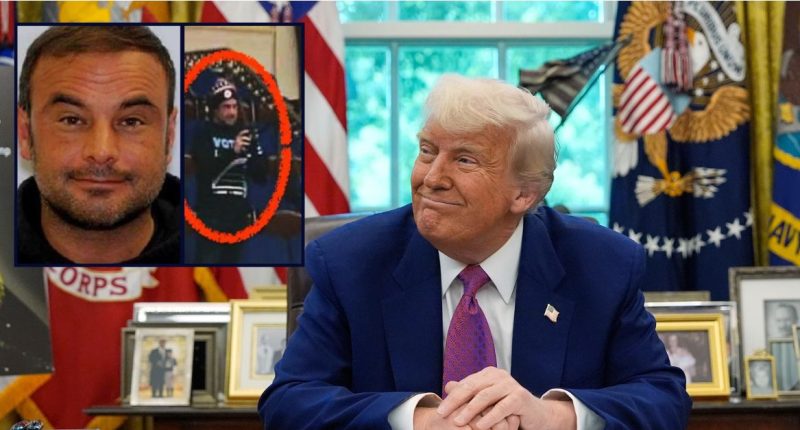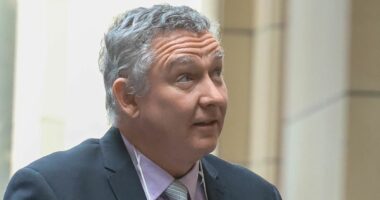Share this @internewscast.com
Pictured left to right: Elias Costianes (Justice Department). A purported image of Elias Costianes within the U.S. Capitol during the January 6 incident (Justice Department). Background: Pictured left to right: Elias Costianes (Justice Department). A purported image of Elias Costianes within the U.S. Capitol during the January 6 incident (Justice Department). Background: President Donald Trump smiles while delivering remarks in the Oval Office of the White House, Tuesday, May 20, 2025, in Washington (AP Photo/Alex Brandon).
A federal judge in Baltimore eventually agreed with the government’s request and implemented President Donald Trump’s broad pardon for January 6 defendants to cover a man’s related but separate gun charge.
In a concise four-page memorandum and order, U.S. District Judge James Kelleher Bredar, appointed by Barack Obama, chose not to elaborate on the details – instead, pointing readers to his previous orders.
Still, the judge offered a brief summary to say that after some lengthy procedural wrangling up and down the court system, the parties, making good on their last chance, complied with the correct rule of federal civil procedure. Bredar was then obligated to dismiss the case – despite repeatedly registering strong misgivings about the proposed dismissal.
“This Court then concluded that the Pardon does not apply, and directed additional briefing with respect to the Rule 48 Motion,” the memorandum reads. “The Court now grants the Rule 48 Motion.”
Love true crime? Sign up for our newsletter, The Law&Crime Docket, to get the latest real-life crime stories delivered right to your inbox.
The timeline of what, exactly, occurred before either party sought to apply the 45th and 47th president’s pardon to the gun crime case is instructive to the judge’s long askance view of the pardon request.
In February 2021, the defendant, Elias Costianes, was brought up on firearms charges following the execution of warrants by federal agents investigating the Jan. 6 riots at the U.S. Capitol Complex. At roughly the same time, federal prosecutors also brought a formally separate case, directly based on allegations that Costianes joined the pro-Trump mob at the Capitol and filmed himself inside the building.
In September 2023, Costianes pleaded guilty to one count of possession of firearms and ammunition by an unlawful user of any controlled substance. He was subsequently sentenced to serve two years in prison, followed by another two years of supervised release.
In February, on the same day he reported to prison, Costianes filed motions with the 4th Circuit Court of Appeals to have his sentence enjoined, stayed and overturned — based on Trump’s blanket pardon issued to all Jan. 6 defendants on Jan. 20.
Procedurally, the case was quickly a mess: the defendant’s pre-pardon appeal was effectively abandoned; then the 4th Circuit asked the defendant and the government to answer specific questions; instead, the parties filed a joint motion to vacate the sentence; that motion was followed by an appellate court order and additional briefing; and then came a remand back down to the district court.
At the same time, lawyers were busy at the district court level. A motion to vacate was tersely denied by Bredar in early March. Then, a motion for release from custody and to stay the sentence pending appeal was volubly nixed by the lower court in late March.
In early April, the case was back before Bredar, with instructions from the 4th Circuit to decide the pardon issue. In response to a series of rulings, the judge told both parties to clarify, fully support, and resubmit their arguments, warning them not to be conclusory.
In early May, the judge went further after looking at the resubmitted arguments – finding the DOJ actually made them in “bad faith” – but offering one final opportunity to convince him.
The government then essayed an argument about money.
“[T]he Department has determined that its resources should not be devoted to investigating and prosecuting certain in-home offenses (like Mr. Costianes’s) that would not have been discovered if the government had not investigated and prosecuted people for their conduct related to the events at or near the United States Capitol on January 6, 2021,” the government’s Rule 48 motion reads. “And because the Department would not investigate or prosecute someone in Mr. Costianes’s shoes today, the Department has further determined that the interests of justice require treating Mr. Costianes similarly. These determinations are wholly discretionary and are based on the Department’s decisions on where its resources are best spent.”
That ultimate effort was apparently availing.
“The Court cannot conclude that the Government has proffered this new and separate explanation in bad faith, and as such, must grant the Rule 48 Motion,” Bredar writes.
Still, the judge is making the parties wait at least a little while longer because the 4th Circuit still has jurisdiction of the appeal – which is technically still an extant and live controversy.
“Giving immediate effect to the granting of the Rule 48 Motion would effectively moot the pending appeal,” the judge explains. Thus, the Court will stay its ruling for 45 days and will direct the Clerk to transmit the relevant rulings to the Court of Appeals.”















